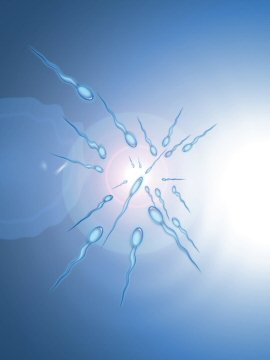 Researchers have found an association between folate - a vitamin found in leafy green vegetables, fruit and pulses (beans, chickpeas and lentils) - levels and chromosomal abnormalities in men's sperm. The journal Human Reproduction reported that men who consumed high levels of folate (a water-soluble B vitamin) and/or folic acid (the synthetic form of the vitamin), tended to have lower levels of abnormal sperm.
Researchers have found an association between folate - a vitamin found in leafy green vegetables, fruit and pulses (beans, chickpeas and lentils) - levels and chromosomal abnormalities in men's sperm. The journal Human Reproduction reported that men who consumed high levels of folate (a water-soluble B vitamin) and/or folic acid (the synthetic form of the vitamin), tended to have lower levels of abnormal sperm. The researchers behind the discovery explained that up to 4 percent of sperm in a healthy man have some type of chromosomal abnormality, but the mechanisms behind the abnormalities are poorly understood and little is known about the effects of men's diet on sperm.
Now, in the first study of its kind to investigate the relationship between sperm abnormalities and diet, the researchers analyzed sperm samples from healthy, non-smoking men and recorded their daily total intake of zinc, folate, vitamin C, vitamin E and beta-carotene. They found no consistent associations between intakes of zinc and the other vitamins and sperm aneuploidy (abnormality). But they did find a statistically significant association between high folate intake and lower sperm aneuploidy.
The researchers cautioned, however, that not too many inferences should be drawn from the findings. "This study cannot prove that high folate intake caused the lower sperm aneuploidy levels, only that there is an association," noted principal investigator Brenda Eskenazi, of the University of California, Berkeley.
While the importance of maternal diet in reproduction is well recognized, the results of the study suggest that the father's diet could play an equally important role in producing healthy offspring. "Previous studies have shown that paternal micronutrient intake may contribute to successful conceptions by improving the quality of the sperm. This study is the first to suggest that paternal diet may play a role in the development of healthy offspring," said Eskenazi.
The current recommended daily intake for men aged over 19 is 400 micrograms, and the researchers say that if other studies confirm their findings, then a possible intervention would be to increase the intake for men considering becoming fathers for at least three months before trying to conceive in order to reduce the risk of chromosomal abnormalities in their children.
Related:
Effects Of Lifestyle And The Environment On Fertility
Sperm Mutation May Cause Fertility Problems
Older Sperm Behind Genetic Mutations
About Aneuploidy
Source: European Society for Human Reproduction and Embryology

